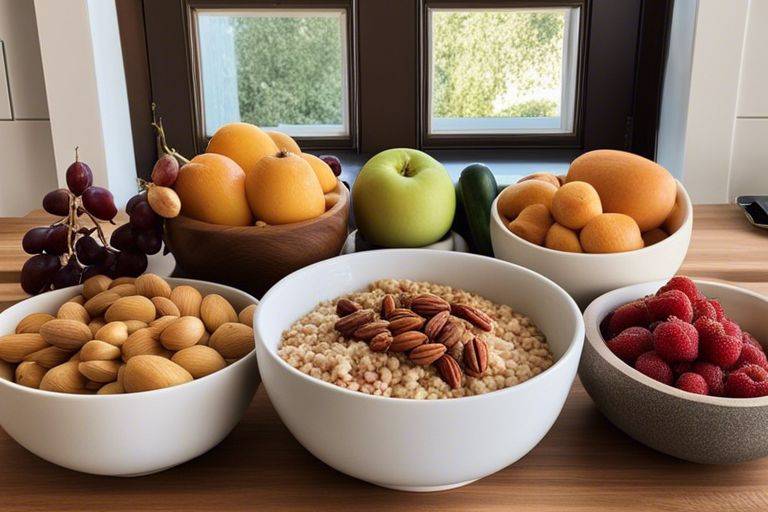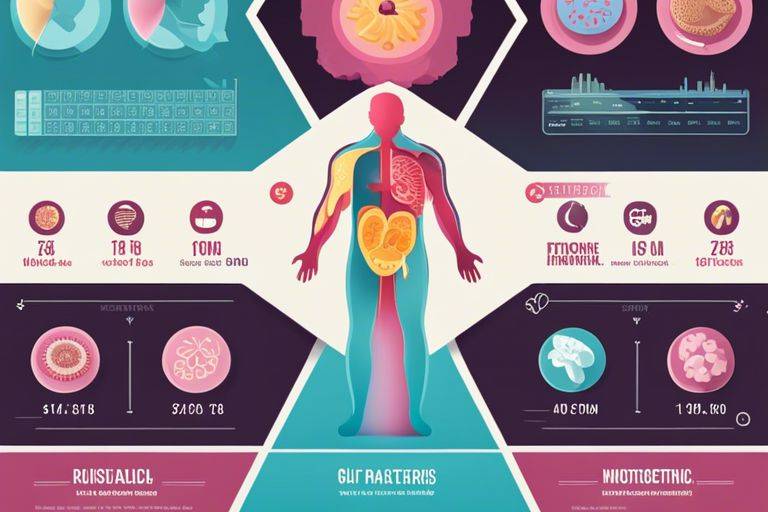Over the years, I’ve come to realize the crucial role that fiber plays in maintaining a healthy gut. In this blog post, I’ll guide you on how to enhance your gut health right from the comfort of your home by incorporating natural fibers into your diet. From the benefits of fiber on gut bacteria to simple ways to increase your fiber intake, I’ll cover it all. Let’s investigate the fascinating world of gut health and discover how natural fibers can make a significant impact on your overall well-being.
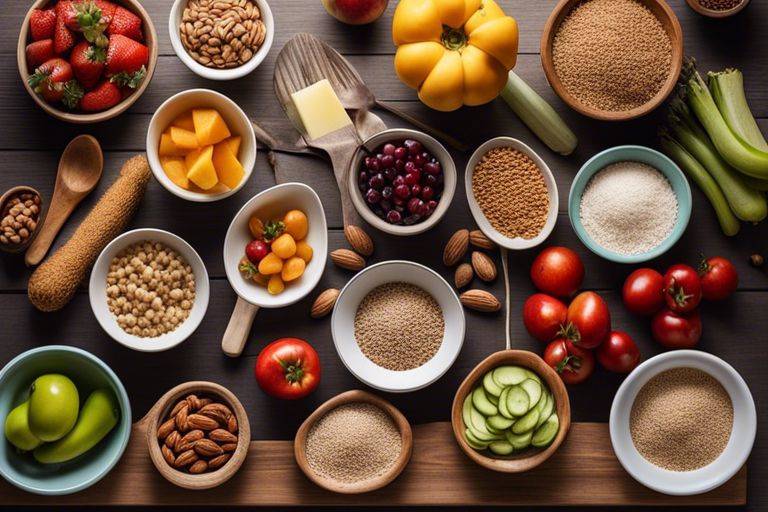
Key Takeaways:
- Diversify fiber sources: Incorporate a variety of natural fibers such as fruits, vegetables, whole grains, legumes, and nuts into your diet to promote gut health.
- Target daily fiber intake: Aim to consume between 25-38 grams of fiber per day for optimal gut function.
- Stay hydrated: Drink plenty of water to help natural fibers move through the digestive system and prevent constipation.
- Prebiotic-rich foods: Include foods like bananas, garlic, onions, and asparagus that feed beneficial gut bacteria and support overall gut health.
- Gradually increase fiber intake: To avoid digestive discomfort, slowly increase your fiber intake and give your body time to adjust.
- Limit processed foods: Reduce consumption of processed foods high in added sugars and low in fiber as they can negatively impact gut health.
- Consult a healthcare professional: If you have digestive issues or concerns about your gut health, seek guidance from a healthcare provider or a registered dietitian.
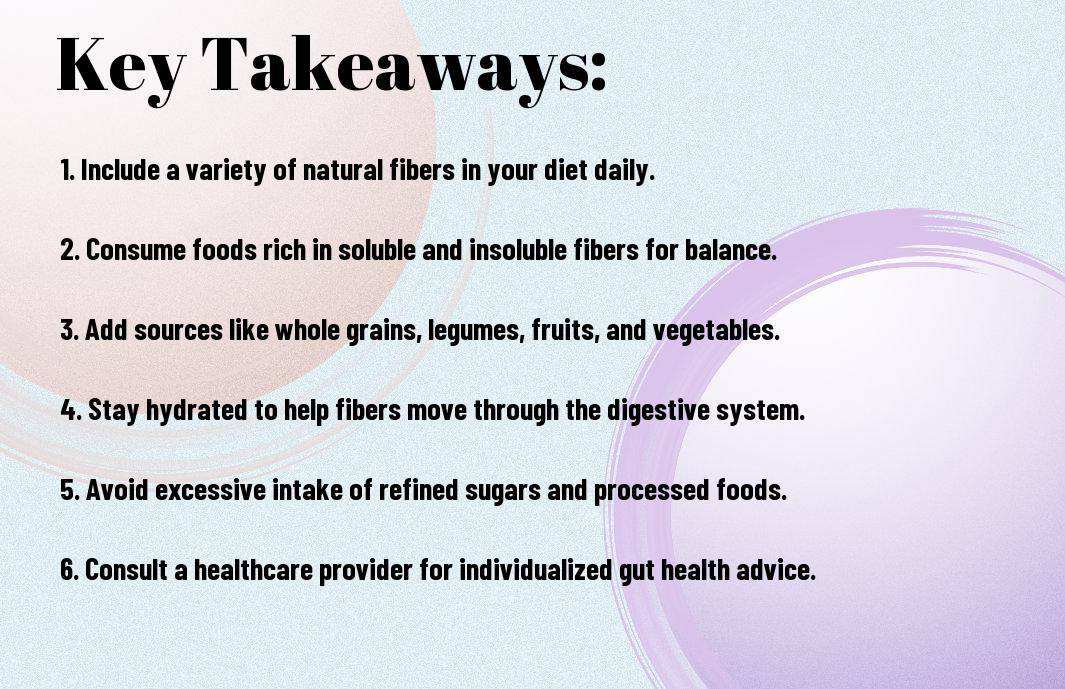
The Importance of Gut Health
While many of us focus on maintaining a healthy diet and exercising regularly, we often overlook the crucial role of gut health in overall well-being. The gut plays a vital role in digestion, nutrient absorption, and even immune function. A healthy gut can contribute to better mental health, higher energy levels, and a stronger immune system.
The Gut-Brain Connection
On a scientific level, the gut and the brain are interconnected through a complex communication system known as the gut-brain axis. The gut is lined with millions of neurons that send and receive signals to the brain, influencing our mood, emotions, and even our cognition. This connection highlights the significance of gut health in mental well-being.
The Role of Gut Bacteria in Immunity
The gut microbiota are the trillions of bacteria living in our digestive system, playing a crucial role in maintaining overall health and immunity. These bacteria help digest food, produce imperative vitamins, and even protect against harmful pathogens. A balanced and diverse gut microbiome is imperative for a robust immune system and overall well-being.
Gut bacteria also help regulate inflammation in the body, a key factor in various chronic diseases. An imbalance in gut bacteria, known as dysbiosis, can lead to immune dysregulation, increasing the risk of autoimmune disorders, allergies, and other health issues. Therefore, supporting a healthy gut microbiome is imperative for a strong immune system.
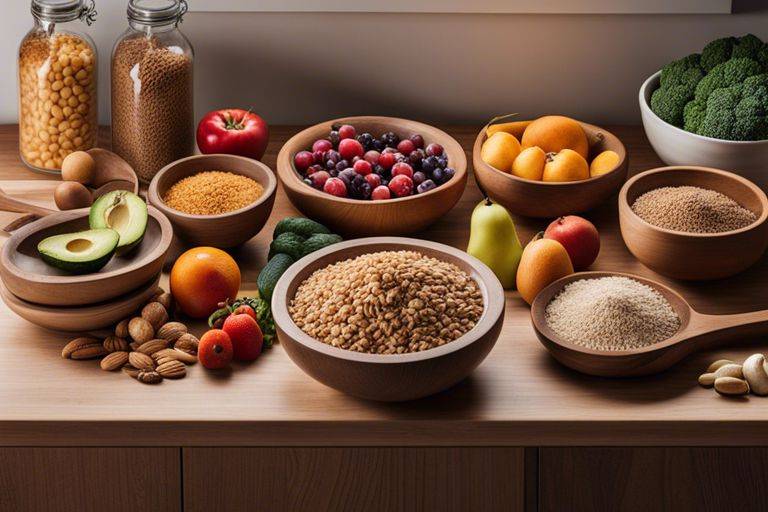
Natural Fibers for Gut Health
Little attention is often given to the importance of incorporating natural fibers into our diets for optimal gut health. Fiber plays a crucial role in supporting digestion, maintaining a healthy gut microbiome, and even promoting a strong immune system. Including a variety of natural fibers in your meals can have a significant impact on your overall well-being.
Soluble vs. Insoluble Fiber: What’s the Difference?
For those unfamiliar with the distinction, soluble fiber dissolves in water to form a gel-like consistency in the gut, helping to slow digestion and regulate blood sugar levels. On the other hand, insoluble fiber adds bulk to the stool, aiding in regular bowel movements and preventing constipation. Both types are important for a balanced diet and a healthy gut.
Top Fiber-Rich Foods for Gut Health
With a diverse range of fiber-rich foods available, it’s easy to boost your gut health through your daily meals. Include fruits like berries, apples, and pears, as well as vegetables such as broccoli, carrots, and Brussels sprouts. Whole grains like oats, quinoa, and brown rice are also excellent sources of fiber to incorporate into your diet. Mixing and matching these foods can provide your gut with the necessary nutrients for optimal functioning.
Natural fibers not only aid in digestion but also serve as a fuel source for beneficial gut bacteria, promoting a thriving gut microbiome. Including a variety of fiber-rich foods in your diet can help maintain a healthy weight, reduce the risk of chronic diseases, and improve overall digestive health. Recall, a diverse diet rich in natural fibers is key to supporting your gut and overall well-being.
Incorporating Natural Fibers into Your Diet
Despite the abundance of processed foods in today’s diet, incorporating natural fibers can significantly improve gut health. According to 10 research-backed ways to improve gut health, increasing fiber intake is vital for a healthy digestive system.
Start with Small Changes: Adding Fiber to Your Meals
For a gradual transition, start by adding small amounts of fiber-rich foods to your meals. Incorporate fruits, vegetables, whole grains, and legumes into your diet to boost fiber intake. Over time, you can increase the fiber content as your body adjusts.
Fiber-Rich Recipes for Breakfast, Lunch, and Dinner
Your meals can be both delicious and nutritious by including fiber-rich recipes for breakfast, lunch, and dinner. Start your day with a hearty oatmeal topped with fresh berries for breakfast. For lunch, try a quinoa salad loaded with colorful veggies, and for dinner, opt for a lentil stew paired with a side of roasted vegetables.
Small changes in your diet, such as incorporating more fiber-rich foods, can have a positive impact on your gut health. These nutrient-dense recipes not only support digestion but also provide vital vitamins and minerals for overall well-being.
The Benefits of Prebiotic-Rich Foods
How Prebiotics Feed Good Bacteria
Unlike probiotics, which are live bacteria introduced into the body, prebiotics are a type of fiber that act as fuel for the good bacteria already present in your gut. By consuming prebiotic-rich foods, you can promote the growth of these beneficial bacteria and support a healthy gut microbiome.
Prebiotic-Rich Foods for a Healthy Gut
For a well-rounded diet that supports your gut health, incorporating prebiotic-rich foods is key. These include foods like onions, garlic, bananas, asparagus, and whole grains. By adding these items to your meals, you can provide your gut with the necessary nutrients to thrive.
Benefits: Including prebiotic-rich foods in your diet can not only improve your digestion and nutrient absorption but also strengthen your immune system and reduce inflammation in the body. These foods are vital for maintaining a balanced and healthy gut microbiome, which is linked to overall well-being and mental health.
Fermented Foods for Gut Health
The Science Behind Fermentation
Science has shown that fermented foods are beneficial for gut health due to the presence of probiotics. These live microorganisms can help maintain a healthy balance of gut bacteria, which is vital for digestion and overall well-being.
Fermented Foods to Add to Your Diet
Diet plays a crucial role in improving gut health, and adding fermented foods to your diet can be a great way to introduce beneficial bacteria. Incorporating foods like yogurt, sauerkraut, kimchi, and kefir can help diversify the microbiome in your gut.
It is important to choose fermented foods that are naturally fermented and contain live cultures. These can provide the most benefits for your gut health. Including a variety of fermented foods in your diet can support digestion, boost immunity, and enhance nutrient absorption.
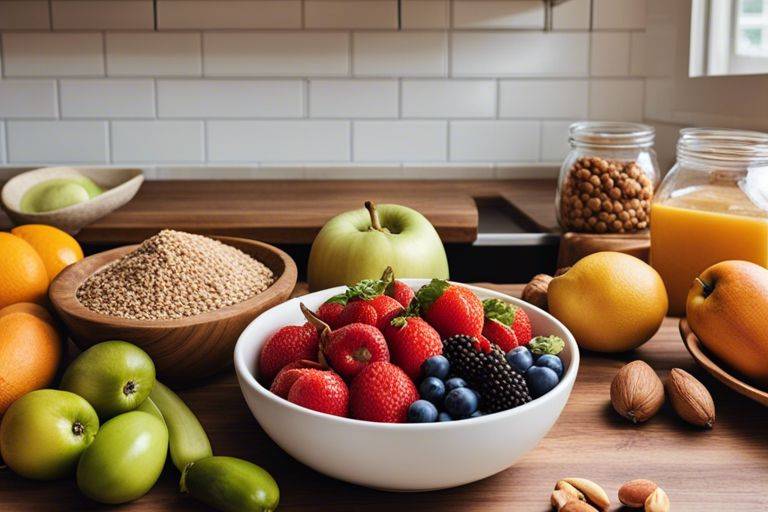
Creating a Gut-Friendly Environment
Many factors contribute to a healthy gut environment, including diet, physical activity, and stress management. Here are some ways you can create a gut-friendly environment at home:
Reducing Stress for a Healthy Gut
For a healthy gut, it’s important to manage stress levels. Stress can disrupt the balance of bacteria in your gut and affect digestion. Practice relaxation techniques like deep breathing, meditation, or yoga to promote a healthy gut.
The Importance of Hydration for Gut Health
Staying hydrated is crucial for maintaining a healthy gut. Stress can lead to dehydration, which can slow down digestion and affect the gut microbiome. Make sure to drink plenty of water throughout the day to keep your gut happy and functioning properly.
Another crucial aspect of hydration for gut health is the impact of water on fiber digestion. Hydration helps soften and bulk up fiber, making it easier for your gut to process and promote regular bowel movements. Be sure to drink water consistently, especially when increasing fiber intake.
To wrap up
Upon reflecting on the importance of enhancing gut health at home with natural fibers, I am reminded of the wisdom in Michael Pollan’s words – “Eat food, not too much, mostly plants.” Incorporating natural fibers from fruits, vegetables, and whole grains into your diet can benefit your gut health and overall well-being. For more tips on improving gut health naturally, check out How to Improve Gut Health Naturally. Keep in mind, a healthy gut is the foundation of good health.
FAQ
Q: What are natural fibers and how do they enhance gut health?
A: Natural fibers are non-digestible carbohydrates found in plant-based foods. They promote gut health by acting as prebiotics, feeding the beneficial bacteria in the gut and promoting a healthy microbiome.
Q: What are some examples of foods that are rich in natural fibers?
A: Foods high in natural fibers include fruits like apples, berries, and bananas, vegetables like broccoli, cauliflower, and sweet potatoes, whole grains like oats and quinoa, and legumes like lentils and chickpeas.
Q: How much natural fiber should I include in my diet to improve gut health?
A: The recommended daily intake of fiber is around 25-30 grams for adults. Gradually increase your fiber intake to avoid digestive issues, and make sure to drink plenty of water to help the fibers move through your digestive system.
Q: Can natural fibers help with digestive issues like constipation and bloating?
A: Yes, natural fibers can help improve digestion by adding bulk to the stool and promoting regular bowel movements. They can also help relieve bloating by supporting a healthy balance of gut bacteria.
Q: Are there any risks associated with consuming too much natural fiber?
A: Consuming excessive amounts of fiber, especially if you’re not used to it, can lead to digestive issues like bloating, gas, and diarrhea. It’s important to gradually increase your fiber intake and listen to your body’s signals.
Q: How can I incorporate more natural fibers into my diet?
A: You can increase your natural fiber intake by adding more fruits, vegetables, whole grains, and legumes to your meals. Start by incorporating one high-fiber food at a time and gradually increase the variety and quantity.
Q: Are there any supplements available for natural fibers?
A: Yes, there are fiber supplements available in the form of powders, capsules, or chewables. However, it’s always best to get your fiber from whole foods as they also provide imperative vitamins, minerals, and antioxidants for overall health.
